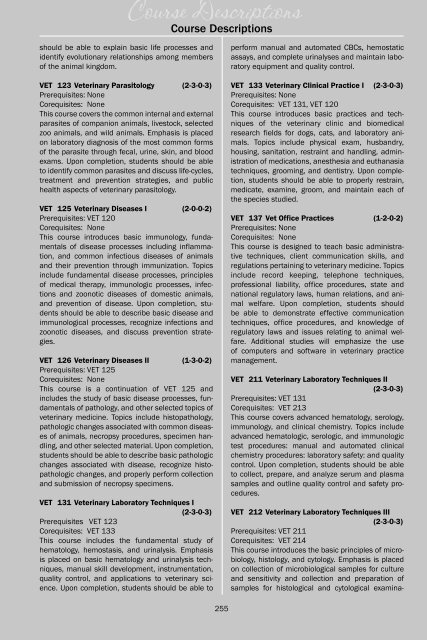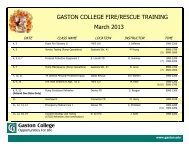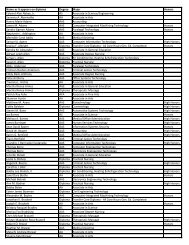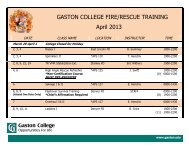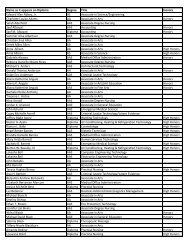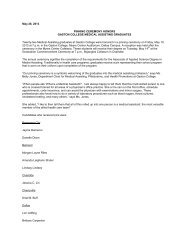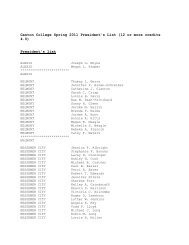Course DescriptionsCourse Descriptionstitioning, and calculations of areas. Topics includeadvanced traverses and adjustments, preparationof survey documents, and other related topics. Uponcompletion, students should be able to research,survey, and map a boundary.SRV 220 Surveying Law (2-2-0-3)Prerequisites: SRV 110Corequisites: NoneThis course introduces the law as related to the practiceof surveying. Topics include surveyors’ responsibilities,deed descriptions, title searches, eminentdomain, easements, weight of evidence, riparianrights, and other related topics. Upon completion,students should be able to identify and apply thebasic legal aspects associated with the practice ofland surveying. Oral and written communicationsskills will be emphasized.SRV 230 Subdivision Planning (1-6-0-3)Prerequisites: SRV 111, SRV 210 and CIV 211Corequisites: NoneThis course covers the planning aspects of residentialsubdivisions from analysis of owner and municipalrequirements to plat layout and design. Topicsinclude municipal codes, lot sizing, roads, incidentaldrainage, esthetic considerations, and other relatedtopics, Upon completion, students should be able toprepare a set of subdivision plans.SRV 240 Topo/Site Surveying (2-6-0-4)Prerequisites: SRV 110Corequisites: NoneThis course covers topographic, site, and constructionsurveying. Topics include topographic mapping,earthwork, site planning, construction staking, andother related topics. Upon completion, studentsshould be able to prepare topographic maps andsite plans and locate and stake out constructionprojects.SRV 250 Advanced Surveying (2-6-0-4)Prerequisites: SRV 111Corequisites: NoneThis course covers advanced topics in surveying.Topics include photogrammetry, astronomical observations,coordinate systems, error theory, GPS,GIS, Public Land System, and other related topics.Upon completion, students should be able to applyadvanced techniques to the solution of complexsurveying problems.SRV 260 Field & Office Practices (1-3-0-2)Prerequisites: Completion of three semesters of theSurveying Technology program.Corequisites: NoneThis course covers surveying project management,estimating, and responsibilities of surveying personnel.Topics include record-keeping, starting andoperating a surveying business, contracts, regulations,taxes, personnel management, and professionalethics. Upon completion, students should beable to understand the requirements of operating aprofessional land surveying business.VETERINARY MEDICAL TECHNOLOGYVET 110 Animal Breeds and Husbandry (2-2-0-3)Prerequisites: NoneCorequisites: NoneThis course provides a study of the individualbreed characteristics and management techniquesof the canine, feline, equine, bovine, porcine, ovine,caprine, and laboratory animals. Topics includephysiological data, animal health management, andbasic care and handling of animals. Upon completion,students should be able to identify breeds ofdomestic and laboratory animals, list physiologicaldata, and outline basic care, handling, and managementtechniques.VET 120 Veterinary Anatomy & Physiology (3-3-0-4)Prerequisites: NoneCorequisites: NoneThis course covers the structure and function of theanimal body with emphasis on the similarities anddifferences among domestic animals. Emphasis isplaced on the structure and function of the majorphysiological systems of domestic, laboratory, andzoo animals. Upon completion, students should beable to identify relevant anatomical structure anddescribe basic physiological processes for the majorbody systems.VET 121 Medical Terminology I (3-0-0-3)Prerequisites: NoneCorequisites: NoneThis course introduces prefixes, suffixes, and wordroots. Topics include medical vocabulary and theterms that relate to the anatomy, physiology, pathologicalconditions, and treatment of selected systems.Upon completion, students should be ableto pronounce, spell, and define medical termsas related to selected body systems and theirpathological disorders. Competency in computerapplication skills necessary for successful medicaltranscription.VET 122 Veterinary Zoology (3-3-0-4)Prerequisites: NoneCorequisites: NoneThis course introduces basic concepts and principlesof biology including cell structure, metabolism,genetics, evolution, and ecology. Topics includeanatomy and physiology, phylogeny, and taxonomyof the animal kingdom. Upon completion, students254
Course DescriptionsCourse Descriptionsshould be able to explain basic life processes andidentify evolutionary relationships among membersof the animal kingdom.VET 123 Veterinary Parasitology (2-3-0-3)Prerequisites: NoneCorequisites: NoneThis course covers the common internal and externalparasites of companion animals, livestock, selectedzoo animals, and wild animals. Emphasis is placedon laboratory diagnosis of the most common formsof the parasite through fecal, urine, skin, and bloodexams. Upon completion, students should be ableto identify common parasites and discuss life-cycles,treatment and prevention strategies, and publichealth aspects of veterinary parasitology.VET 125 Veterinary Diseases I (2-0-0-2)Prerequisites: VET 120Corequisites: NoneThis course introduces basic immunology, fundamentalsof disease processes including inflammation,and common infectious diseases of animalsand their prevention through immunization. Topicsinclude fundamental disease processes, principlesof medical therapy, immunologic processes, infectionsand zoonotic diseases of domestic animals,and prevention of disease. Upon completion, studentsshould be able to describe basic disease andimmunological processes, recognize infections andzoonotic diseases, and discuss prevention strategies.VET 126 Veterinary Diseases II (1-3-0-2)Prerequisites: VET 125Corequisites: NoneThis course is a continuation of VET 125 andincludes the study of basic disease processes, fundamentalsof pathology, and other selected topics ofveterinary medicine. Topics include histopathology,pathologic changes associated with common diseasesof animals, necropsy procedures, specimen handling,and other selected material. Upon completion,students should be able to describe basic pathologicchanges associated with disease, recognize histopathologicchanges, and properly perform collectionand submission of necropsy specimens.VET 131 Veterinary Laboratory Techniques I(2-3-0-3)Prerequisites VET 123Corequisites: VET 133This course includes the fundamental study ofhematology, hemostasis, and urinalysis. Emphasisis placed on basic hematology and urinalysis techniques,manual skill development, instrumentation,quality control, and applications to veterinary science.Upon completion, students should be able toperform manual and automated CBCs, hemostaticassays, and complete urinalyses and maintain laboratoryequipment and quality control.VET 133 Veterinary Clinical Practice I (2-3-0-3)Prerequisites: NoneCorequisites: VET 131, VET 120This course introduces basic practices and techniquesof the veterinary clinic and biomedicalresearch fields for dogs, cats, and laboratory animals.Topics include physical exam, husbandry,housing, sanitation, restraint and handling, administrationof medications, anesthesia and euthanasiatechniques, grooming, and dentistry. Upon completion,students should be able to properly restrain,medicate, examine, groom, and maintain each ofthe species studied.VET 137 Vet Office Practices (1-2-0-2)Prerequisites: NoneCorequisites: NoneThis course is designed to teach basic administrativetechniques, client communication skills, andregulations pertaining to veterinary medicine. Topicsinclude record keeping, telephone techniques,professional liability, office procedures, state andnational regulatory laws, human relations, and animalwelfare. Upon completion, students shouldbe able to demonstrate effective communicationtechniques, office procedures, and knowledge ofregulatory laws and issues relating to animal welfare.Additional studies will emphasize the useof computers and software in veterinary practicemanagement.VET 211 Veterinary Laboratory Techniques II(2-3-0-3)Prerequisites: VET 131Corequisites: VET 213This course covers advanced hematology, serology,immunology, and clinical chemistry. Topics includeadvanced hematologic, serologic, and immunologictest procedures: manual and automated clinicalchemistry procedures: laboratory safety: and qualitycontrol. Upon completion, students should be ableto collect, prepare, and analyze serum and plasmasamples and outline quality control and safety procedures.VET 212 Veterinary Laboratory Techniques III(2-3-0-3)Prerequisites: VET 211Corequisites: VET 214This course introduces the basic principles of microbiology,histology, and cytology. Emphasis is placedon collection of microbiological samples for cultureand sensitivity and collection and preparation ofsamples for histological and cytological examina-255
- Page 2 and 3:
PLEASE NOTETHE FOLLOWING ITEMS HAVE
- Page 4 and 5:
Student InformationTable of Content
- Page 6 and 7:
Student InformationMission Statemen
- Page 8 and 9:
Student Information2011-2012 Academ
- Page 10 and 11:
Student InformationAdmissionssectio
- Page 16 and 17:
Student InformationFinancial AidU.S
- Page 18 and 19:
Student InformationFinancial AidThe
- Page 20 and 21:
Student InformationEducational Prog
- Page 22 and 23:
Student InformationEducational Prog
- Page 24 and 25:
Student InformationCounselors or ad
- Page 26 and 27:
Student InformationPrograms of Stud
- Page 28 and 29:
Student InformationDevelopmental Ed
- Page 30 and 31:
Student InformationVarious institut
- Page 32 and 33:
Student InformationPolicies & Proce
- Page 34 and 35:
Student InformationPolicies & Proce
- Page 36 and 37:
Student InformationPolicies & Proce
- Page 38 and 39:
Student InformationPolicies & Proce
- Page 40 and 41:
Student InformationPolicies & Proce
- Page 42 and 43:
Student InformationStudent Services
- Page 44 and 45:
Student InformationCollege Transfer
- Page 46 and 47:
Student InformationCollege Transfer
- Page 48 and 49:
Student InformationCollege Transfer
- Page 50 and 51:
Student InformationCollege Transfer
- Page 52 and 53:
Student InformationCollege Transfer
- Page 54 and 55:
Student InformationCollege Transfer
- Page 56 and 57:
Student InformationCollege Transfer
- Page 58 and 59:
Degrees, Diplomas & CertificatesA.A
- Page 60 and 61:
Degrees, Diplomas & CertificatesA.A
- Page 62 and 63:
Degrees, Diplomas & CertificatesA.A
- Page 64 and 65:
Degrees, Diplomas & CertificatesA.A
- Page 66 and 67:
Degrees, Diplomas & CertificatesA.A
- Page 68 and 69:
Degrees, Diplomas & CertificatesA.A
- Page 70 and 71:
Degrees, Diplomas & CertificatesA.A
- Page 72 and 73:
Degrees, Diplomas & CertificatesA.A
- Page 74 and 75:
Degrees, Diplomas & CertificatesA.A
- Page 76 and 77:
Degrees, Diplomas & CertificatesA.A
- Page 78 and 79:
Degrees, Diplomas & CertificatesA.A
- Page 80 and 81:
Degrees, Diplomas & CertificatesA.A
- Page 82 and 83:
Degrees, Diplomas & CertificatesA.A
- Page 84 and 85:
Degrees, Diplomas & CertificatesA.A
- Page 86 and 87:
Degrees, Diplomas & CertificatesA.A
- Page 88 and 89:
Degrees, Diplomas & CertificatesA.A
- Page 90 and 91:
Degrees, Diplomas & CertificatesA.A
- Page 92 and 93:
Degrees, Diplomas & CertificatesA.A
- Page 94 and 95:
Degrees, Diplomas & CertificatesA.A
- Page 96 and 97:
Degrees, Diplomas & CertificatesA.A
- Page 98 and 99:
Degrees, Diplomas & CertificatesA.A
- Page 100 and 101:
Degrees, Diplomas & CertificatesA.A
- Page 102 and 103:
Degrees, Diplomas & CertificatesA.A
- Page 104 and 105:
Degrees, Diplomas & CertificatesA.A
- Page 106 and 107:
Degrees, Diplomas & CertificatesA.A
- Page 108 and 109:
Degrees, Diplomas & CertificatesDip
- Page 110 and 111:
Degrees, Diplomas & CertificatesDip
- Page 112 and 113:
Degrees, Diplomas & CertificatesDip
- Page 114 and 115:
Degrees, Diplomas & CertificatesDip
- Page 116 and 117:
Degrees, Diplomas & CertificatesDip
- Page 118 and 119:
Degrees, Diplomas & CertificatesDip
- Page 120 and 121:
Degrees, Diplomas & CertificatesDip
- Page 122 and 123:
Degrees, Diplomas & CertificatesDip
- Page 124 and 125:
Degrees, Diplomas & CertificatesCer
- Page 126 and 127:
Degrees, Diplomas & CertificatesCer
- Page 128 and 129:
Degrees, Diplomas & CertificatesCer
- Page 130 and 131:
Degrees, Diplomas & CertificatesCer
- Page 132 and 133:
Degrees, Diplomas & CertificatesCer
- Page 134 and 135:
Degrees, Diplomas & CertificatesCer
- Page 136 and 137:
Degrees, Diplomas & CertificatesCer
- Page 138 and 139:
Degrees, Diplomas & CertificatesCer
- Page 140 and 141:
Degrees, Diplomas & CertificatesCer
- Page 142 and 143:
Degrees, Diplomas & CertificatesCer
- Page 144 and 145:
Degrees, Diplomas & CertificatesCer
- Page 146 and 147:
Degrees, Diplomas & CertificatesCer
- Page 148 and 149:
Degrees, Diplomas & CertificatesCer
- Page 150 and 151:
Course DescriptionsKEY TO COURSE DE
- Page 152 and 153:
Course DescriptionsCourse Descripti
- Page 154 and 155:
Course DescriptionsCourse Descripti
- Page 156 and 157:
Course DescriptionsCourse Descripti
- Page 158 and 159:
Course DescriptionsCourse Descripti
- Page 160 and 161:
Course DescriptionsCourse Descripti
- Page 162 and 163:
Course DescriptionsCourse Descripti
- Page 164 and 165:
Course DescriptionsCourse Descripti
- Page 166 and 167:
Course DescriptionsCourse Descripti
- Page 168 and 169:
Course DescriptionsCourse Descripti
- Page 170 and 171:
Course DescriptionsCourse Descripti
- Page 172 and 173:
Course DescriptionsCourse Descripti
- Page 174 and 175:
Course DescriptionsCourse Descripti
- Page 176 and 177:
Course DescriptionsCourse Descripti
- Page 178 and 179:
Course DescriptionsCourse Descripti
- Page 180 and 181:
Course DescriptionsCourse Descripti
- Page 182 and 183:
Course DescriptionsCourse Descripti
- Page 184 and 185:
Course DescriptionsCourse Descripti
- Page 186 and 187:
Course DescriptionsCourse Descripti
- Page 188 and 189:
Course DescriptionsCourse Descripti
- Page 190 and 191:
Course DescriptionsCourse Descripti
- Page 192 and 193:
Course DescriptionsCourse Descripti
- Page 194 and 195:
Course DescriptionsCourse Descripti
- Page 196 and 197:
Course DescriptionsCourse Descripti
- Page 198 and 199:
Course DescriptionsCourse Descripti
- Page 200 and 201:
Course DescriptionsCourse Descripti
- Page 202 and 203:
Course DescriptionsCourse Descripti
- Page 204 and 205:
Course DescriptionsCourse Descripti
- Page 206 and 207: Course DescriptionsCourse Descripti
- Page 208 and 209: Course DescriptionsCourse Descripti
- Page 210 and 211: Course DescriptionsCourse Descripti
- Page 212 and 213: Course DescriptionsCourse Descripti
- Page 214 and 215: Course DescriptionsCourse Descripti
- Page 216 and 217: Course DescriptionsCourse Descripti
- Page 218 and 219: Course DescriptionsCourse Descripti
- Page 220 and 221: Course DescriptionsCourse Descripti
- Page 222 and 223: Course DescriptionsCourse Descripti
- Page 224 and 225: Course DescriptionsCourse Descripti
- Page 226 and 227: Course DescriptionsCourse Descripti
- Page 228 and 229: Course DescriptionsCourse Descripti
- Page 230 and 231: Course DescriptionsCourse Descripti
- Page 232 and 233: Course DescriptionsCourse Descripti
- Page 234 and 235: Course DescriptionsCourse Descripti
- Page 236 and 237: Course DescriptionsCourse Descripti
- Page 238 and 239: Course DescriptionsCourse Descripti
- Page 240 and 241: Course DescriptionsCourse Descripti
- Page 242 and 243: Course DescriptionsCourse Descripti
- Page 244 and 245: Course DescriptionsCourse Descripti
- Page 246 and 247: Course DescriptionsCourse Descripti
- Page 248 and 249: Course DescriptionsCourse Descripti
- Page 250 and 251: Course DescriptionsCourse Descripti
- Page 252 and 253: Course DescriptionsCourse Descripti
- Page 254 and 255: Course DescriptionsCourse Descripti
- Page 258 and 259: Course DescriptionsCourse Descripti
- Page 260 and 261: Course DescriptionsCourse Descripti
- Page 262 and 263: Administration, Faculty & StaffFacu
- Page 264 and 265: Administration, Faculty & StaffFacu
- Page 266 and 267: Administration, Faculty & StaffFacu
- Page 268 and 269: Administration, Faculty & StaffFacu
- Page 270 and 271: Administration, Faculty & StaffFacu
- Page 272 and 273: Administration, Faculty & StaffFacu
- Page 274 and 275: Administration, Faculty & StaffFacu
- Page 276 and 277: Administration, Faculty & StaffFacu
- Page 278 and 279: Administration, Faculty & StaffFacu
- Page 280 and 281: IndexIndex- C -Career Scholarships
- Page 282 and 283: IndexIndexIndustrial Systems Techno
- Page 284 and 285: MapsDallas (Main) Campus, Dallas, N
- Page 287: MapsKimbrell Campus & Textile Techn


